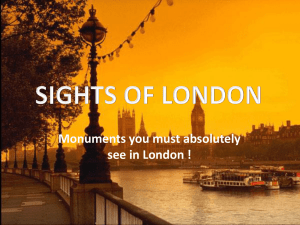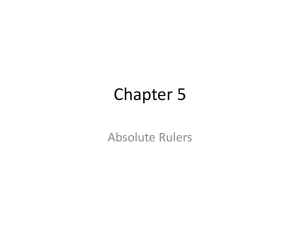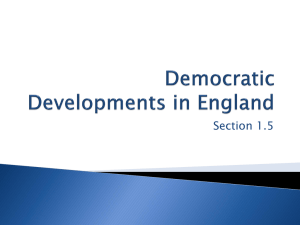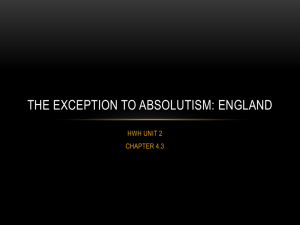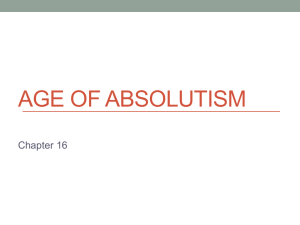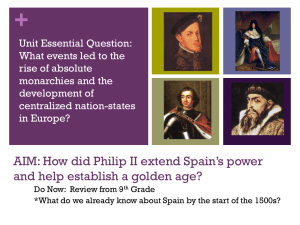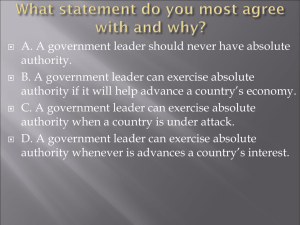Ch 18.2,18.3,18.4,19.1,19.2 Absolute Monarchs/Enlightenment
advertisement
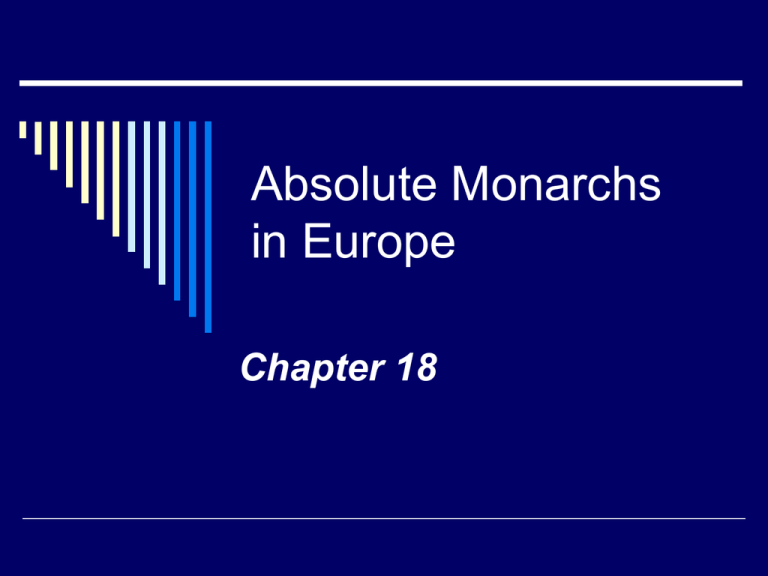
Absolute Monarchs in Europe Chapter 18 Quick Question… What do you think of when you hear the word “ABSOLUTE” What are some synonyms for this word? Quick Introduction… What is an ABSOLUTE MONARCH? A king or queen who has total power, and seeks to control all aspects of society What gives the king their power? Divine Right – belief that God gave the king his “right” to be king (God’s Representative) Feudalism Need for Central Power Renaissance Evolution of Absolutism Growth of Cities Growth of Nationalism Absolutism in France: th The Reign of Louis 14 Chapter 18 Section 2 Pages 540-544 What you will learn Henry IV, Louis XIII, and Louis XIV strengthened the French monarchy, with Louis XIV setting the example of an absolute monarch for the rest of Europe Setting the Stage for Louis 14 King Henry IV There were BIG problems in France with religious connotations. The Catholics and the Huguenots (French Protestants) were constantly fighting. Huguenots were a threat to Catholics 1/10 French were Huguenots Un roe, une loi, une foi “ One King, One law, One Religion” Monarchy saw Huguenots as a challenge to this St. Bartholomew's Day Massacre Huguenots and Catholics had been fight for years 1572 Paris Streets run red Henry of Navarre’s (protestant) and Marguerite de Valoi’s (Catholic) Wedding day Brides mother (Queen) ordered all of the protestants in for wedding to be killed 10K-70K protestants killed, Henry would escape Henry would be next inline for throne Converted to Catholicism and crowned King Henry IV III. Setting the Stage for Louis 14 There was a time of peace when Henry of Navarre (a Huguenot prince) came to power He converted to Catholicism in order to help the country Signed the Edict of Nantes meant religious toleration for the Huguenots in France. Gave them limited freedoms One King, one law, one religion is no longer Catholicism still official religion of France King Henry IV Focused on repairing war torn France Fixed financial situation Eliminated debt and built a surplus Created new industry Built roads and canals He was assassinated by a fanatic who did not like What’s Happening? How did Henry IV end France’s wars of religion? By converting to Catholicism and granting certain rights to the Huguenots Why did the Catholics accept the Edicts of Nantes? Because it ended the religious wars but still declared Catholicism as France’s official religion Why would the French royal family want to kill all the Huguenots? Killing them would put an end to the fighting Setting the Stage for Louis 14: Louis 13 B. Louis 13th WEAK king- young, mom ruled for several years Richelieu was his main “advisor” He pretty much ran the kingdom, not Louis He hated the Huguenots Strengthened his own power by weakening the nobles influence (made them take down their fortified castles) La Rochelle, Huguenots side with English, Upon their defeated all churches had to become catholic Repressed Huguenot Nobles with spies and harsh punishment More interested in Strengthening the Monarchy than supporting Catholics What’s Happening? How did Louis XIII and Cardinal Richelieu strengthen the French monarchy? Reduced power of Huguenots; How did Richelieu plan to strengthen the monarchy? By crushing his opponents Louis 14 The Most Powerful Ruler of France “I am the state” – meaning that he was France Sun King Began his rule when he was 4 years old Because he was so young when he took over, he had an advisor – Mazarin. Mazarin’s “rule” caused the nobles to revolt. Louis hated this and made up his mind that he would become so powerful that the nobles would NEVER rise against him. Louis excluded them from councils and taxed them Absolutism at Versailles Demanded to be in charge of all military, political, and economic initiatives. Best Example of an Absolute Monarch Religion of his subject were also under his direct control Built a enormous palace, Versailles Greatest ambition was to build up military and expand French Territory Louis’ Palace: The Palace at Versailles The Palace at Versailles was 14 miles outside of Paris. 5,000 acres of forests, gardens, and lawns 1,400 Fountains, so many that they could not even run them all at the same time. (The workers would just turn them on when Louis walked by, and turn them off when he walked away.) The cost to build them palace was approximately $2.5 billion. It took 36,000 people to build the Palace at Versailles. People who wanted to speak to the king could not knock on his door. Instead, using the left pinkie finger, they had to gently scratch on the door, until they were granted permission to enter. As a result, many courtiers grew that fingernail longer than the others Why do you think that Louis built this palace? Palace at Versailles Palace at Versailles The Actions of Louis 14 Expanded the economy Jean Baptist Colbert – Minister of Finance used Mercantilism to build France’s bank accounts Focused on making money in the New World (fur trade) Limited imports and increased exports Over-turned the Edict of Nantes Persecuted the Huguenots, so they 200 K left, and took jobs and money with them. Pampered himself Lived in TOTAL luxury, had 500 servants, cooks, etc. who looked after his every desire. Louis 14 Extends France’s Borders Under Louis’ leadership, France became the most powerful nation in Europe. Largest Population French Army: Best trained, best weapons, most soldiers Louis 14 Extends France’s Borders With this large army, Louis began to expand the French borders. Early in his campaigns he had success Eventually his luck ran out Hurt the people, b/c the high cost war was paid with taxes- went to war 4 times Would melt down royal silver to pay for supplies One Last War for the French The French people wanted peace. What they got was another war The War of Spanish Succession France and Spain were on the verge of unification Wanted Spanish throne for his son Other countries of Europe were scared that this would be too much power for the Bourbon Kings. Result: Spain and France were beaten by England, Netherlands and Holy Roman Empire, and the thrones were not permitted to be unified. Treaty of Utrecht French Expansion Louis 14: Legacy & Death Positives that Louis Brought Strengthened France in Art & Literature Strengthened French Military and influence in Europe Strengthened the French Colonies in the New World Negatives that Louis Brought Constant Warfare Lost of debts (palace and fighting) High Taxes for the people Set the stage for the French Revolution Louis died in his bed in 1715. The French people celebrated when they heard the news. What’s Happening? What were the causes and effects of the Spanish Succession? Caused when other European powers did not want to see Louis XIV’s son become king of Spain Resulted in giving Louis’s grandson the throne, but keeping France and Spain from being ruled by the same monarch Using your notes, fill in the interactive graphic organizer by describing how the power of the French monarchy increased under Henry IV, Louis XIII, and Louis XIV. Monarchy in England Chapter 18 Section 3 Pages 545-550 Bell ringer 18.3 Write a brief description of either the St. Bartholomew’s Day Massacre or the palace that Louis XIV built at Versailles. Use details that will help your reader visualize the scene. 5 Points 7 Sentence Min What you will learn today In contrast to the absolute monarchy France, the English monarchy was limited by Parliament; following a civil war, Parliament became even more powerful Monarchs Defy Parliament First, you need to understand that a MONARCHY is a form of ABSOLUTISM. The Monarchs (Kings and Queens) felt that they were above the law (i.e. – Parliament) Parliament – English version of Congress Monarchs vs. Parliament Queen Elizabeth – she had problems with the parliament regarding money James I – he had problems with the parliament regarding religion Charles I – fired the Parliament – just got rid of it! Recap Henry VII creates Protestant church to divorce wife- not able to have male child Daughter, Mary take thrown, switch back to Catholicism and kills protestants Daughter, Elizabeth takes thrown, switches back to Catholic Church All of this is done with the help of parliament passing laws. Elizabeth Parliament wants her to marry so there will be a male heir to the thrown, but she refuses to do so She doesn’t want to share the power with anybody She does have a good relationship with Parliament as they are able to speak their mind w/o fear of punishment. What’s Happening How did the Tudors work with Parliament? Henry VIII teamed with Parliament to pass a series of laws to convert England to Protestantism and name him head of the Church of England, Elizabeth I needed the help of Parliament to re-establish herself as the head of the Church of England What do you think would have happened if Elizabeth I had married? Might have lost power because her husband would have wanted to play a part in a growing England James I Problems with Parliament Elizabeth's Successor Relative from Scotland Believed in the Devine Rights of Kings Bad relations with Parliament Absolute Power From Scotland Low funds from predecessors James rarely got what he wanted from Parliament Who really has the power? James I Problems with Religion Parliament is increasing power Puritans are on the rise Religious group who wants to purify the church Thought church was too catholic Robes/kneeling Puritans wanted to take power away from church officials Church leadership supported James I James refuses to pass most reform does have Bible written in English. King James Charles I James dies and son Charles I is crowned. Married a catholic woman and went to war (English are Happy). He is very popular. War = $$ In order to continue conquests he must ask parliament to raise taxes. The only way that Parliament would give him money is if he signed the Petition of Right. No false imprisonment No taxes w/o Parliament’s consent No housing of soldiers in homes No martial (absolute) law in peace time Charles I vs. Parliament The Petition of Right was a direct challenge to Absolute Monarchy Charles signed it – then he IGNORED it. He needs more $ and goes back to Parliament but is denied. Charles fired Parliament for 11 years Then he needed them back to get him some money – for more wars He “re-hired” them. But after 11 years, who is in the power seat? Charles I vs. Parliament Parliament took this opportunity to further limit kings power and further empower Parliament Charles is not done yet! A radical Puritan group within parliament has moved to abolish the appointment of Bishops within Catholic Church The kings power is directly connected to church officials Charles again fires Parliament What’s Happening? What led the first two Stuart kings to clash with Parliament? Went to Parliament to raise money, rarely able to get what he wanted What did Charles I do when Parliament refused to give him money after he signed the Petition of Rights? He taxed the English people and dismissed Parliament English Civil War Why? – because the people were mad at Charles for firing the Parliament (and Parliament was mad too) When? – 1642 – 1649 Loyalists •Supported Charles •Called “Cavilers” Also called “Royalists” VS Puritans •Supported Parliament •Called Roundheads •Leader was Oliver Cromwell Results of the English Civil War Oliver Cromwell’s Roundheads defeated the Cavilers and imprisoned Charles They put Charles I on trial, sentenced him to death – chopped his head off. Changes in Power Oliver Cromwell took over following the civil war Dismissed Parliament Formed a Commonwealth Republican based government Formed a military state Lord Protector of England Fought with Dutch of trade Very strict Closed theatres Limited popular entertainment THE PEOPLE ARE UNHAPPY What's Happening? What were the causes and results of the English Civil War? CAUSE: Parliament limited Charles I power and refused to give him money RESULT: Charles I executed, Monarchy and house of Lords abolished, England becomes a common wealth Defender of Absolutism Thomas Hobbs- Leviathan Describes human as being naturally selfish and fearful Life in nature is solitary, poor, nasty, brutish, and short People need an all powerful monarch to tell them how to live. The Restoration (Charles II) After Cromwell died, the people wanted to have a king – Charles II (Charles I son) took over. (weak) He got along better with the Parliament, restoration took place in England. Was weak to Parliament Was quick to given in Supported public construction Reopened theatres What’s Happening? Do you think that England was better off under the commonwealth or under the monarchy? Why did Parliament vote to bring back the monarchy? People were unhappy with new Puritan laws, and Cromwell’s son was an uninspiring leader Glorious Revolution 1685 Charles II died with NO heir His brother James II took over (but he was catholic!) Believed in Absolute Monoarchy He soon offended Parliament and voted some Catholic friends into high office (against the law) Parliament protested, so he fired them His wife then had a son and the people were scared that a long line of Catholics would rule. Glorious Revolution HOWEVER, James had an older Protestant daughter (Mary) who married William of Orange. Parliament invited William to overthrow James II. He brought and army, James II was scared and fled the country Thus, the Glorious Revolution began and ended with no fighting William and Mary begin their reign and develop a CONSTITUTIONAL MONARCHY : There is a monarch in place, however they are limited in their power What’s Happening? Why are the events of 1688 known as the glorious revolution? A new king and king took power without blood shed Pop Quiz True/False Indicate whether the statement is true or false. ____ ____ ____ 1.Queen Elizabeth I had a good relationship with Parliament and called it into session ten times during her 45-year reign. 2.Oliver Cromwell as Lord Protector of England clamped down on social life by closing theaters and limiting other forms of popular entertainment. 3.William and Mary were crowned king and queen of England in order to prevent a Puritan monarch from occupying the throne. Pop Quiz Answers True/False Indicate whether the statement is true or false. 1.Queen Elizabeth I had a good relationship with Parliament and called it into session ten times during her 45-year reign. TRUE 2.Oliver Cromwell as Lord Protector of England clamped down on social life by closing theaters and limiting other forms of popular entertainment. TRUE 3.William and Mary were crowned king and queen of England in order to prevent a Puritan monarch from occupying the throne. FALSE Using your notes, fill in the graphic organizer by identifying the causes of the decreasing power of the monarchy. 5 Points Rulers of Russia and Central Europe Chapter 18 Section 4 P. 552-557 Russia Before Ivan Far behind Western Development Run by church officials Boyars (landowners) 1546 young prince named Ivan Took title of Czar Intended to rule w/o limits Crash Course Russia, the Kievan Rus, and the Mongols: Crash Course World History #20 - YouTube Russia’s Absolute Ruler: Ivan IV Ivan IV a.k.a “Ivan the Terrible” Came to the throne when he was only 3 years old. At the age of 16 he crowned himself czar (Caesar) and took control Why would he want to be recognized as “czar?” Two Stages of Ivan’s Life “Good Stage” – 1547-1560 Married Anastasia Expanded Russia’s lands Expanded to the East Volga River Territory Increased trade Cleaned-up the Russian legal system General council included low class and merchants Promoted military by merit not social status WIFE (ANASTASIA) DIED / He thought she was poisoned. Two Stages of Ivan’s Life “Bad Stage” – 1560-1584 Ivan put together a “secret police” who went around hunting those suspected of being traitors (killed 1000s) Punished anyone who spoke out against czar Killed an entire city (Novgorod) Wanted to separate form Russia Killed his own son (oldest) Details about killing his son In 1581, Ivan beat his pregnant daughter-in-law for wearing immodest clothing, causing a miscarriage. His son, also named Ivan, upon learning of this, engaged in a heated argument with his father, which resulted in Ivan striking his son in the head with his pointed staff, causing his son's (accidental) death. This event is depicted in the famous painting by Ilya Repin, Ivan the Terrible and his son Ivan on Friday, November 16, 1581 better known as Ivan the Terrible killing his son Russia’s Struggles After Ivan killed his oldest son there was only his weak, youngest son to rule. He was too weak to lead effectively. He died without an heir. The Time of Trouble began Economic, problems, Foreign invasion, uncertainty This began the rule of the Romanov Dynasty in Russia (lasts 300 years) Enter Czar Peter the Great Czar Peter I Known as Peter the Great 6’8” tall Took over in 1696 Removed his sister from power 1st act was to attack Azov (city held by Turks) Failure, but learned from mistakes Along side carpenters, he built a navy and Azov Surrendered Czar Peter I Strengthened the power of the czar (that is added to his ABSOLUTE POWER) When Peter took over Russia was very backwards, in that they still based their society on Vassals, serfs, etc., Peter was determined to change this. Peter’s Reforms In 1697, Peter made a grand tour of Western Europe. Peter wanted to learn about their customs and manufacturing techniques. In order to make “Westernize” Russia, Peter had to strengthen is ABSOLUTE POWER. Here’s what he did: Controlled the Russian Church Reduced the power of the Upper Class, and created a Middle Class Disbanded the Streltsy (politically based Army) Enlarged the Russian Army (raised taxes to pay them) Peter’s Westernization of Russia The Westernization Process Introduced Potatoes as a part of their diet Started a newspaper Allowed women to attend social gatherings Had the Nobles start wearing Western Fashions Education Focus: Sponsored Schools: Navigation, Arts, and Sciences St. Petersburg: Russia’s warm water port (named after Peter’s Patron Saint) Results of Peter’s Actions: Russia became modernized, and better off as a result of his efforts. Catherine the Great Grew angry with husband Czar Peter III Seized power after the Czar was murdered Catherine the Great Reforms Worked on Westernization efforts of Peter the Great Believed that a wise stronger ruler could improve the lives of their subjects Reformed legal and education systems Removed trade restrictions Promoted Science and arts Defeated and took over Poland, valuable outlet for sea trade Russia take over Poland Why is this important? Catherine the Great While fighting a man saying he was Peter III (not murdered) stepped forward saying the throne was his He put together a ragtag army of peasants and rebelled This was put down Catherine decided she needed to strengthen the Monarchy in rural areas She reorganized local government in the hands of nobles and landowners In return for their services, she lowered their taxes and gave them absolute control over their lands and peasants Monarchy and conflict in Central Europe Unlike Monarchs of Western Europe and Russia, Central Europe had no Absolute Monarchs The Holy Roman Empire Has an emperor, but the Empire has several smaller states each with its Own ruler The Hapsburgs In 1450 all of the small states had a ruler that came from the same family- The Hapsburgs One rule would try to exert his authority on all the States IV. The 30 Years War When: 1618 – 1648 Where: Bohemia (Czech Republic) Who: Protestants (with Lutheran help) and Catholics Details: Conflict over religion, territory, and for power among European ruling families Results: Hurt Germany most (lost 4 million people) Treaty: Peace of Westphalia This was the last religious war in Europe Europe became a group independent countries, rather than a Catholic Empire The 7 Years War When: 1756 - 1763 Where: Europe, India, North America Who: England vs. France (and their allies) Results: England gained the most They took all of France’s holding in the New World England gained trading domination in India The Scientific Revolution & Enlightenment New Models and Methods Chapter 19 Sec 1-2 Pages 567-579 Bellringer 19.1 Imagine that you are a German engineer who has moved to Russia to help Peter the Great build St. Petersburg. Write a letter in which you try to persuade another professional back home to come work with you in Russia. 5 points By the 17th Century, many changes had begun to occur: Scientists all over Europe kept in touch Science became a big business Newton’s theory of the Universe – Huge influence on both scientific & political/social thinking Application of Science to Industry Popularized Science Themes of the Scientific Revolution Science = a philosophy Science is practical Science creates repercussions in theology & philosophy – Deism: “Clockwork Universe” – Traditional churches of all kinds were threatened by new ideas about man and God. More Themes Science created repercussions in political thought, as well. – Scientific Revolution led to a belief in democracy & freedom Rational order in the universe – it was possible scientifically, politically, and socially All of worlds problems could be solved with reason What you will Learn New ways of thinking led to remarkable discoveries during the Scientific Revolution. Old Views Scholars relied on church and traditional authorities for their beliefs on the structure of the earth These old ideas were upheld by the church – Geocentric Theory – Taught god put earth at the center of the universe Scholars would begin to challenge these traditional way and begin a new way of thinking – Questioning the natural world Claudius Ptolemy The Universe Ptolemy’s model of the universe was generally accepted by ancient & medieval scientists (geo-centric with concentric crystalline spheres) Aristotle was 1st to Produce this theory Why new way of thinking Exploration- lead to study of natural world – Ancient scholars could give no info about these new lands – New people and animals never seen before Maybe there are other things out there that have yet to be discovered – The more the examined natural world, the more they realized ancient beliefs did not match New Views Challenged old views Based on Europeans learning advances made by Arab world Posed theories about natural world and then tested them – Called Scientific Method Scientific Method The Scientific Method is a set of techniques for acquiring new knowledge about the natural world based on observable, measurable evidence. – Step 1 Identify a problem or a research question to be answered. – Step 2 Form a hypothesis that can be tested. A hypothesis is a proposed answer to the research question and is based on previous knowledge. – Step 3 Perform experiments to test the hypothesis. – Step 4 Record the results of the experiments. – Step 5 Analyze the results of the experiments to form a conclusion that either proves or disproves the hypothesis. What’s Happening? What changes led to the dawn of modern science? – Traditional authorities challenged: new theories proposed and tested; exploration led to closer study of natural world; development of scientific methods How was the scientific method different than pervious methods of thinking – Reliance on testing ideas by experimentation; rather than accepting the views of traditional authorities Two scholars who help develop the Scientific method Rene Descartes Rene Descartes: Rationalist Tried to use reason to explain the world— didn’t trust the senses. – Doubted everything until it could be proved by reason 1637: Discourse on Method: emphasis on deduction & math – Relied heavily on math and logic to prove truths Sir Francis Bacon Only way to gain scientific knowledge is by experimentation Observing measuring, explaining, verifying Induction vs. Deduction Medieval scientists believed in the ideas of Aristotle: Deductive Method: look at the “whole” and make hypotheses about it Bacon rejected the deductive method & advocated the Inductive method: look at the parts and make hypotheses about the whole. Copernicus- Astronomer Heliocentric universe in which stars and planets are points of light with circular orbits. 1st scientist to complete a model of the solar system using science, physics, and mathematics Published “On the Revolutions of the Heavenly Orbs” in 1473 – did so on his death bed as he fear church opposition Tycho BraheAstronomer/Mathematician Observed the heavens and decided that all of the heavenly bodies orbited around the sun, except for the earth and its moon, and that the sun and its planetary system revolved around the earth. Brahe’s Model Kepler Accepted & revised the Copernican model Elliptical (oval) orbits Proved mathematically that the sun is the center of the universe. Kepler’s Model Galileo Galileo Improved the telescope and used it to observe the moon, stars, and other heavenly bodies 1610: Published “Starry Messenger” in which he claimed there were mountains on the moon and moons around Jupiter. 1613: Sunspots discovered Controversy with the Church Between 1613 and 1616, Galileo wrote a series of letters concerning the truth of the Copernican model. – The 1616 letter came to the attention of an influential Cardinal who had it put on the Index of Prohibited Books. – He was ordered NOT to hold Copernican views. More Controversy 1624-30: Galileo wrote “Dialogue Concerning the Two Chief Systems of the World: Ptolemaic & Copernican” – Banned immediately – Put on Trial in 1633 and found guilty of breaking the 1616 sentence. – Put under house arrest where he was supervised by officers of the Inquisition. What’s Happening? What discoveries occurred in astronomy, physics, and math during the Scientific Revolution? – Heliocentric theory; plants orbited the sun; predictable laws of movement; calculus Why were Galileo’s books so contraversial? – They contradicted the official Church viewpoints that the sun orbited the earth Sir Isaac Newton Sir Isaac Newton 1668: built the first reflecting telescope Laws of motion Law of universal gravitation 1687: Published “Principial Mathematican” 1704: Published “Optics” in which he included his explanation of differential calculus as an appendix. – Developed calculus independent of Leibniz Scientists Antony van Leeuwenhoek was 1st to invent microsope Robert Boyle, the father of modern Chemistry, was 1st to define an element and described matter as a cluster of tiny particles What Happening? How did scientific ideas move beyond the realm of science and affect society? – Science and religion combined to produce artistic achievement of the Renaissance; Scientist challenged some of the traditional ideas of the church Using your notes, fill in the graphic organizer by listing the causes and the effects of new discoveries made during the Scientific Revolution 5 Points The Enlightenment Chapter 19 Sec 2 Pages 574-579 Bell Ringer 9.2 Suppose that you are an astronomer during the mid-1500s. Write a short speech explaining why the scientific method would reveal truth more accurately than reliance upon traditional authorities. What you will learn European thinkers developed new ideas about government and society during the Enlightenment. The Age of Reason Scientific Revolution convinced many people in the power of reason – Could it be used to study human nature too – Reason can be used to solve human problems Philosophies' Philosophies had differing beliefs about issues, such as the perfect form of government, etc., but they all shared a basic unity of thought. Similarities All applied reason to their analysis of society All believed in progress and looked optimistically toward the future All sought reform to establish and protect human liberties All attacked the abuses of the Old Regime Thomas Hobbs- political thinker Wrote Leviathan Based upon his horrific experiences in English Civil War People are self fish and greedy – People need government Social contract – People should give up some freedoms in exchange for peace, saftey, and order that government will provide Monarchy was best form of government – Strong central power could be used to impose law and order Locke: Empiricist People are naturally happy, tolerant and reasonable Everyone is born free with natural rights of life, liberty and property. Locke: Empiricist Purpose of the government was to protect the people Monarchs were not chosen by God – Instead the people consented to the government, who power was limited by law “Two Treatises of Civil Government” 1690 – If government failed to protect it citizens’ natural rights, they people had the right to over throw Revolution Important Ideas of Locke “Tabula Rosa” All knowledge comes from sense impressions made on the mind from birth. – At birth the mind is like a “blank slate” – Our picture of the world is built up of the impressions which are imprinted on our mind through numerous observations during our lifetime. More Important Ideas Man is a “rational” being that can be improved by education and proper upbringing. Provided a “scientific” reason for reform Toleration, respect for reason, optimism about human perfectibility, and political freedom were all hallmarks of the Enlightenment that stemmed from Locke. Rousseau “Force does not constitute right... obedience is due only to legitimate powers” Rousseau (1712 – 1778) A romantic, he differed from the rest by questioning the generally accepted faith in reason and science as a means to a good life People were born basically good – Society corrupted man Civilization was a disease that had corrupted man and led him into slavery – “Man is born free, but everywhere he is in chains . . . (Social Contract) Social Contract All men begin in a state of nature, where they are “benevolent natives.” – Human nature is innately good—man is corrupted by society. The first person to fence off his property ruined this idyllic state of affairs and created a need for government—thus a social contract was made between citizens. A social contract was a deal made among the people themselves in which the supreme authority was to be the general will. Government Direct democracy, an agent of the people Revolution is advisable, if the government no longer serves the needs of the people, and it can be changed whenever the people wish. Montesquieu “The love of democracy is that of equality” Montesquieu (1689 – 1755) Most famous book: The Spirit of the Laws Relativist: no one best form of government exists. – Good government should vary with the circumstances of the nation—education, climate, soil, size, religion, customs, etc. Necessary Factors No matter which type of government was chosen, two characteristics needed to be present for there to be “good government” – Checks and Balances – Separation of Powers Voltaire “Liberty of Thought is the Life of the Soul” Voltaire (1694-1778) Longest-lived, most prolific philosopher Believed the universe is governed by natural laws which can’t be changed by man. Rejected the idea of innate ideas and held that knowledge is acquired through experience which is interpreted by reason. Man and human nature are basically good Diderot (1713 – 1784) Editor-in-chief of the Encyclopedie (vol. 1 published in 1751) – 27 years to write – Propagandistic—designed to show up the faults of society and to promote rationalism, science, a respect for natural law, and the need for reform to create social progress – Helped spread Enlightenment ideas – Censored by the Catholic church Economic Reformers Physiocrats: a group of economic thinkers who believed in the existence of natural economic laws. – Economic harmony would result when these natural laws were left alone to operate freely – Called for a laissez-faire economy Mary Wollstonecraft Demanded equal rights for women – Especially in education A Vindication of the Rights of Women – If men and women were equal in education then they would be equal in society Adam Smith Adam Smith (1727 – 1790) Father of Modern Capitalism/Laissez-Faire – Business activities hsoul take place in the free market – argued against the protection of home industries by imposing tariffs – Argued that in the long run it would be to the nation’s advantage not to restrict imports by tariffs. Government interference justified only for the purpose of defense or to extend or protect the rights and liberties of citizens Wanted funding of public education. Most Famous Quote Every individual...generally, indeed, neither intends to promote the public interest, nor knows how much he is promoting it. By preferring the support of domestic to that of foreign industry he intends only his own security; and by directing that industry in such a manner as its produce may be of the greatest value, he intends only his own gain, and he is in this, as in many other cases, led by an invisible hand to promote an end which was no part of his intention. Enlightened Absolutism Ideas of enlightenment thinkers became popular with some absolute monarchs Monarchs tried to justify their despotic rule by claiming that they were governing in the interests of the people. Some enlightened despots really did care about the condition of the people are were willing to offer limited reforms as long as the reforms did not jeopardize their power. Enlightened Monarchs Enlightened Monarchs included: – Frederick II (the Great) of Prussia – Catherine II (the Great) of Russia – Joseph II of Austria All of these monarchs sought to provide educational opportunities, hospitals, and cultural opportunities to at least some portion of their population. Frederick II Catherine II Joseph II Using your notes, fill in the interactive graphic organizer by describing how Enlightenment ideas affected government 1. How was the Enlightenment influenced by reason? 2. What new views did philosophers have about government? 3. What new views did philosophers have about society? 4. How did Enlightenment ideas spread?

